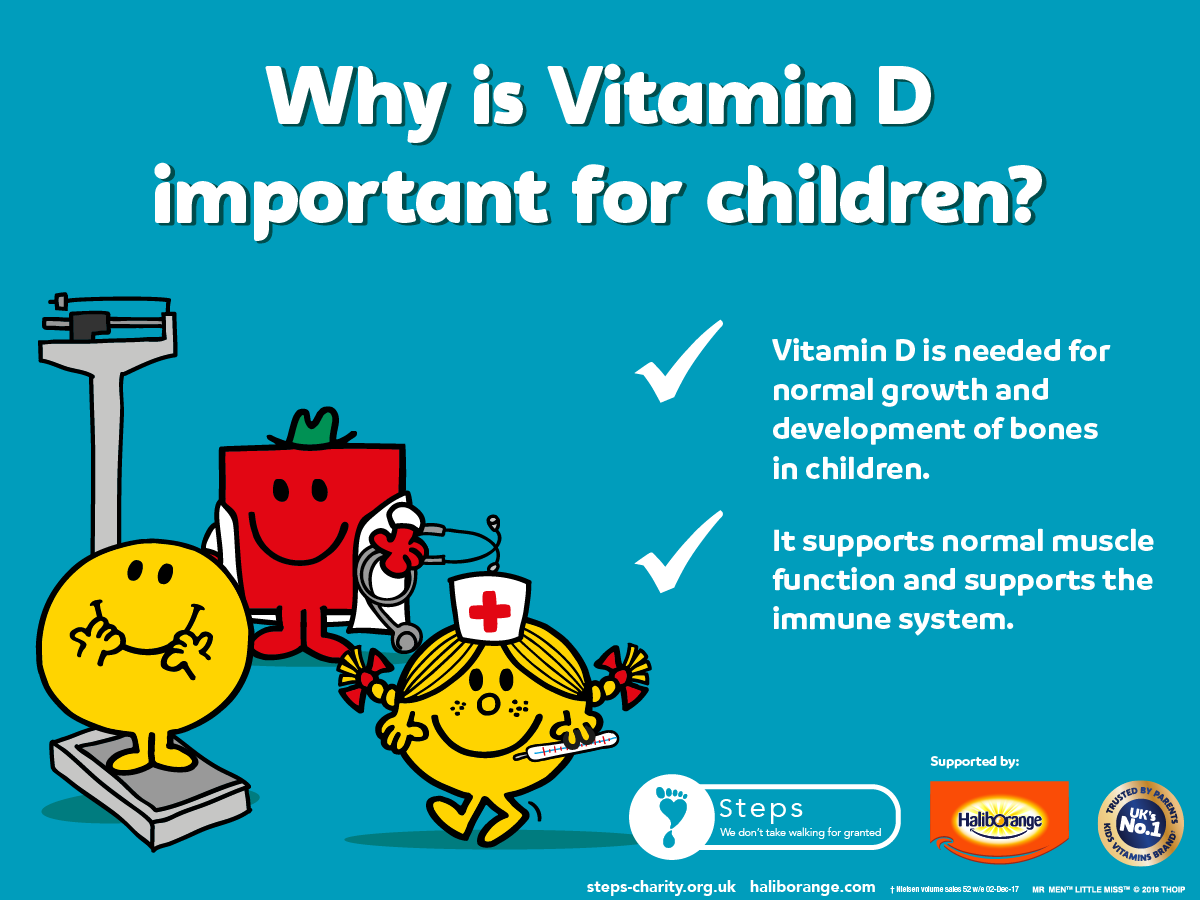Why is Vitamin D important for children?
Raising awareness about the importance of the vitamin in essential to prevent disabling bone disease such as rickets. A Victorian illness which is on the rise in the UK. Vitamin D is essential to protect bone and muscle health.
We are pleased to announce that Steps will be working for the second year with @HaliborangeUK to promote Vitamin D awareness.
We have produced posters for hospitals and clinics and will be discussing Vitamin D, how your children get enough and its importance for the normal development of healthy bones. Just like and comment to join the #vitaminD conversation and follow us on Twitter @steps_charity

If you are a parent or practitioner and want a free Vitamin D awareness poster for your clinic, hospital or GP’s surgery, please contact info@steps-charity.org.uk (always ask permission of the clinic first).
According to the Public Health England (PHE), to protect bone and muscle health, everyone needs vitamin D equivalent to an average daily intake of 10 micrograms.
This advice is based on the recommendations of the Scientific Advisory Committee on Nutrition (SACN) following its review of the evidence on vitamin D and health.
Vitamin D is made in the skin by the action of sunlight and this is the main source of vitamin D for most people. SACN could not say how much vitamin D is made in the skin through exposure to sunlight, so it is therefore recommending a daily dietary intake of 10 micrograms.
PHE advises that in spring and summer, the majority of the population get enough vitamin D through sunlight on the skin and a healthy, balanced diet. During autumn and winter, everyone will need to rely on dietary sources of vitamin D. Since it is difficult for people to meet the 10 microgram recommendation from consuming foods naturally containing or fortified with vitamin D, people should consider taking a daily supplement containing 10 micrograms of vitamin D in autumn and winter.
People whose skin has little or no exposure to the sun, like those in institutions such as care homes, or who always cover their skin when outside, risk vitamin D deficiency and need to take a supplement throughout the year. Ethnic minority groups with dark skin, from African, Afro-Caribbean and South Asian backgrounds, may not get enough vitamin D from sunlight in the summer and therefore should consider taking a supplement all year round.
Children aged 1 to 4 years should have a daily 10 microgram vitamin D supplement. PHE recommends that babies are exclusively breastfed until around 6 months of age. As a precaution, all babies under 1 year should have a daily 8.5 to 10 microgram vitamin D supplement to ensure they get enough. Children who have more than 500ml of infant formula a day do not need any additional vitamin D as formula is already fortified.
Dr Louis Levy, Head of Nutrition Science at PHE, said:
A healthy, balanced diet and short bursts of sunshine will mean most people get all the vitamin D they need in spring and summer. However, everyone will need to consider taking a supplement in the autumn and winter if you don’t eat enough foods that naturally contain vitamin D or are fortified with it. And those who don’t get out in the sun or always cover their skin when they do, should take a vitamin D supplement throughout the year.
Vitamin D supplements are available free-of-charge for low-income families on the Healthy Start scheme.
Vitamin D regulates the amount of calcium and phosphate in the body, both needed for healthy bones, teeth and muscles. It is found naturally in a small number of foods including oily fish, liver and egg yolks and in fortified food like breakfast cereals and fat spreads. For more information click here
